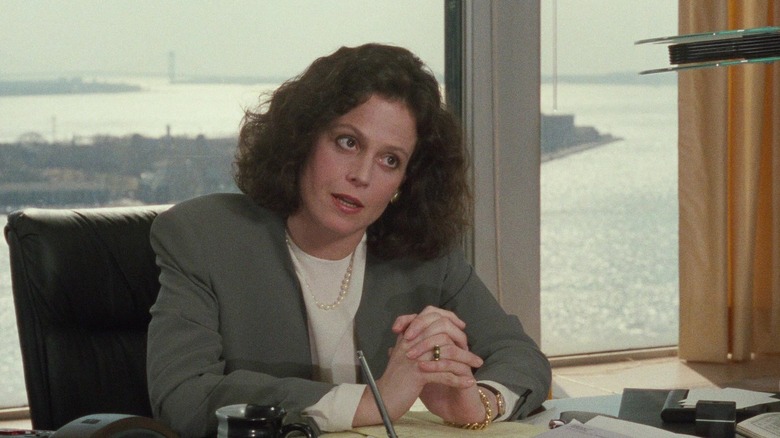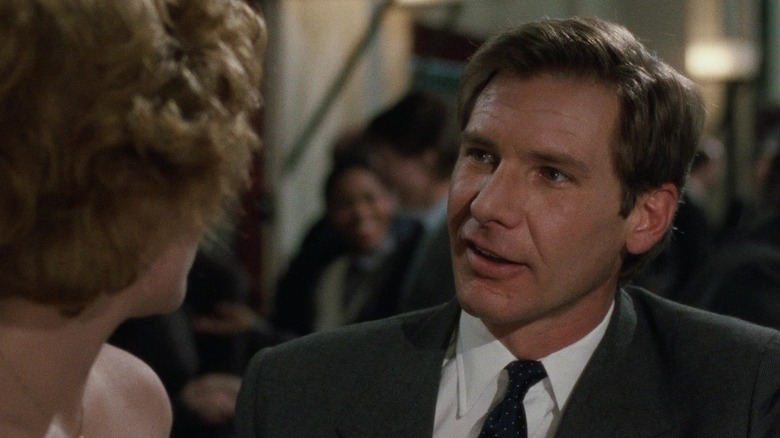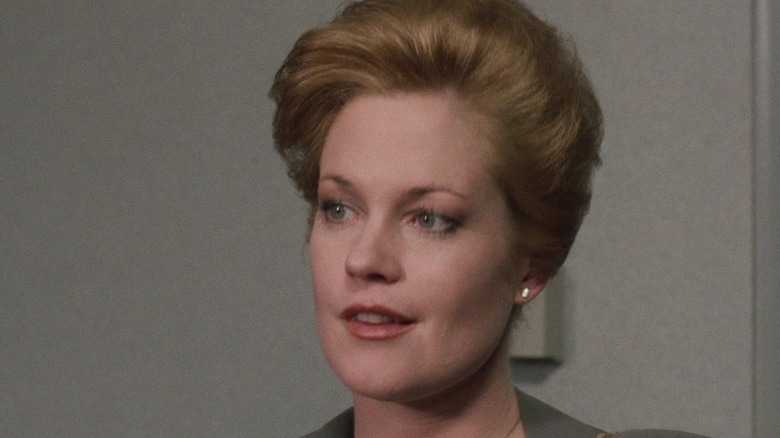The High Price Tag For Sigourney Weaver And Harrison Ford Made Casting Awkward On Working Girl
Back in 1988, a film called "Working Girl" appeared on the scene. It was the story of Tess (Melanie Griffith), a young working woman in New York City who dreams of something bigger. Of course, she's treated like a piece of meat with no brains by her male bosses and even her boyfriend (Alec Baldwin). She gets a new gig with a female boss named Katharine (Sigourney Weaver), who is terrible in a different way, stealing Tess's good ideas and using them as her own.
Tess is asked to house-sit for Katharine (yes, this sort of thing absolutely happened back then) and discovers the theft. She poses as Katharine to get her idea out there to the big bosses, steals Katharine's boyfriend Jack (Harrison Ford), who was going to break up with her anyway, and wins the day.
"Working Girl" was nominated for six Academy Awards, and a reboot appears to be on the way with Selena Gomez ("Only Murders in the Building"). The film didn't have the easiest time getting made, according to a 2018 feature in The Hollywood Reporter, which gave an oral history from the people involved. As it turns out, one of the biggest obstacles was the price tag for two major stars.
'It would be great if we could get Harrison Ford'
Sigourney Weaver, one of the big names, had worked with "Working Girl" director, the late Mike Nichols, before on "Hurlyburly," so she was really interested in playing Katharine, who Weaver told THR was "one of these faux aristocrats. Having grown up in New York, you meet all kinds of people like that." For Tess, though they'd been looking at people like Madonna, Michelle Pfeiffer, and even "Cheers" star Shelley Long, Melanie Griffith and her team fought to get the role, and she won it during her screen-test with her rendition of the famous line, "I have a head for business and a body for sin. Is there anything wrong with that?"
Writer Kevin Wade told THR that they still needed to cast Jack when Nichols said, "'It would be great if we could get Harrison Ford.' We all went, 'Yeah,' and he said, 'No, no, I am serious. He would have great fun with this.'" Since Ford told the publication he was looking for something different than what he'd done in the past, it seemed like a perfect fit. The issue was the price tag.
Swapping Harrison for Alec
Producer Doug Wick explained that they had both Harrison Ford and Sigourney Weaver onboard, but the studio didn't want to pay that much money. The alternative was casting Alec Baldwin in the Jack role "because he was affordable." Back then, he reminded THR, Ford was coming off of "Star Wars" and "Indiana Jones," and Weaver had "Alien," so they were both in demand. Of course, being in demand means that you're a box office draw, and the studio recognized that. According to Wick:
"The studio called back and said, 'No, we want to pay for Harrison and Sigourney.' So, Mike [Nichols] had to call Alec and say, 'Look, I'm really sorry. The circumstances have changed. Would you do this other part?' Alec understood and was so lovely about it. He came in and really nailed that character. It was an awkward adjustment."
Oof, that's a demotion, but these things happen in Hollywood, and "Working Girl" became a box office success. It's a little hard to watch now, from the extreme whiteness of the cast to the sexualization of the main character to the way the film suggests that a man getting a woman drunk and not sleeping with her anyway is a virtue signal. Still, for its time, it was pretty groundbreaking.
Honestly, just watch it for the wild hairstyles alone and let that be enough.


